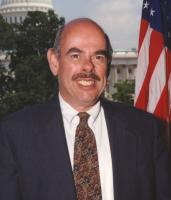It has been a long time coming–and its arrival leaves me feeling almost like I’m witnessing the end of an era.
Yesterday Rep. Henry Waxman, chairman of the House Committee on Oversight, published a long awaited report (PDF), 16 months in the making, that probably represents the most comprehensive investigation yet of how the Bush administration has interfered with and suppression the communication of information about the science of climate change.
And the conclusion is stark: “The Bush Administration has engaged in a systematic effort to manipulate climate change science and mislead policymakers and the public about the dangers of global warming.”
This isn’t, to be sure, a very surprising result.
Such abuses against the integrity of scientific information in the climate arena have, after all, has been much discussed and complained about in the past. I went over it all in detail in my 2005 book The Republican War on Science, but there had been complaints dating back long, long before that–and after my book appeared the outrage stories only continued.
So in some sense, we have heard this all before.
But in another sense, there’s something very new about Waxman’s report. You see, a journalist like myself has very limited means at his disposal for getting information out of this very strategic (and very unhelpful, and sometimes just plain dishonest) administration.
In essence, we can work from official statements, we can do interviews, and we can use the Freedom of Information Act. All of these tools have been used repeatedly by journalistic investigators to figure out what has really been going on behind the scenes.
But Waxman had far more powerful investigative tools at his disposal. Once Democrats became the majority party in Congress in late 2006 and Waxman took control of the Oversight Committee, he suddenly had powers of subpoena.
And though the Bush administration unsurprisingly resisted providing much requested information to Waxman’s committee, ultimately this leverage helped ensure the release of 27,000 pages of internal documents.
Further, the committee took depositions and affidavits, and held public hearings. In short, it acted at an investigative level beyond what’s possible for the average journalist.
Based on all this information, the Waxman reports finds that the administration committed the following types of violations: Channeling media requests to speak to government scientists to the White House Council on Environmental Quality for approval, whereupon some were turned down, obviously based on political considerations; editing congressional testimony about climate science to downplay the seriousness, urgency, or certainty levels of the information; and editing many administration reports on the same subject in the same way.
In many of these areas, the Waxman report contains either new evidence of scandals, or additional details about previously known scandals.
First, then, let’s recall the previously known scandals.
They include, among many others,
1) the White House’s bowdlerizing of the climate change section of a proposed EPA Report on the Environment–the changes were so heavy-handed and so misrepresentative of scientific understanding that EPA decided to pull the entire global warming chapter;
2) the repeated inaccurate editing of government climate science documents by lawyer Philip A. Cooney, who had previously worked on climate change policy at the American Petroleum Institute and later went on to work for ExxonMobil; 3) the attempts to control media access to top climate scientists in the employ of government, such as James Hansen of NASA and Thomas Knutson of NOAA.
Most of us have heard these tales in the past. But the Waxman report fills them out in additional detail and with added evidence–which, in each case, only further confirms the inexcusability of the administration’s behavior.
And then there are new scandals that appear in the Waxman report. For instance, the screwy editing of congressional testimony delivered by Thomas Karl, director of NOAA‘s National Climatic Data Center, including changes like the following:
The initial draft read: “The state of the science continues to indicate that modern climate change is dominated by human influences.” Mr. Rainey replaced “dominated” with “affected,” which significantly weakened the statement. His explanatory comment was: “not supported by evidence, there are views all over the place.”
Mr. Rainey deleted the statement: “In many respects we are venturing into the unknown territory with changes in climate, and its associated effects.” His comment was: “doesn’t add anything to testimony & opens up for real hard question.”
All in all, as someone who has been over this same trail of evidence multiple times since the year 2003, reading the Waxman report doesn’t fundamentally tell me anything that I didn’t know before. However, the report does make what I already knew seem more certain and indisputable than ever before.
This administration not only fiddled, but lied, while the planet burned. Now it has all been documented about as well and as extensively as anyone could ever demand.
It’s our job never to forget it.
Subscribe to our newsletter
Stay up to date with DeSmog news and alerts






